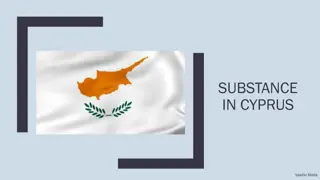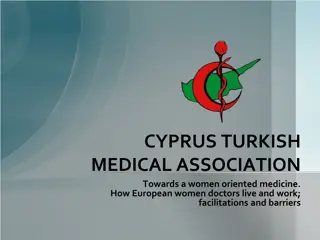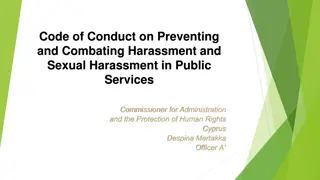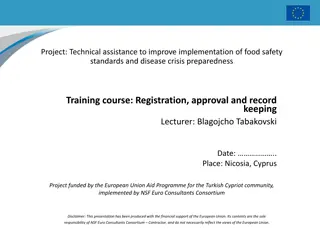
Cyprus Legal System Challenges and Solutions
Delve into the complexities of the Cyprus legal system, addressing challenges from dealing with Northern Cyprus to potential solutions for cross-border disputes. Gain insights into the country's history, mixed legal system, and environment for legal proceedings, offering valuable lessons for legal practitioners and scholars alike.
Download Presentation

Please find below an Image/Link to download the presentation.
The content on the website is provided AS IS for your information and personal use only. It may not be sold, licensed, or shared on other websites without obtaining consent from the author. If you encounter any issues during the download, it is possible that the publisher has removed the file from their server.
You are allowed to download the files provided on this website for personal or commercial use, subject to the condition that they are used lawfully. All files are the property of their respective owners.
The content on the website is provided AS IS for your information and personal use only. It may not be sold, licensed, or shared on other websites without obtaining consent from the author.
E N D
Presentation Transcript
THE VIEW FROM CYPRUS Nikitas E. Hatzimihail
PAPER OUTLINE 1. The Context - Brief Introduction to the Cyprus Legal System - Brief introduction to the Cyprus Problem 2. Challenges and Lessons from Dealing with Northern Cyprus - A de facto legal system - Problem cases 3. Potential challenges in dealing with PS NRS - Identifying areas of challenge - Potential legal solutions
OUTLINE OF PRESENTATION 1. Cyprus as a Jurisdiction of Interest 2. The Cyprus problem 3. Cases involving post-Soviet
CYPRUS: COUNTRY PROFILE Ethnic composition: Greek Turkish (4:1) Official languages: Greek (and Turkish) British possession and Colony of the Crown, 1878-1960 Independence, 1960 (British Sovereign Base Areas remain colonial Cyprus law applies, not part of the EU) Turkish invasion, 1974 loss of control over 37% of territory EU Accession, 2004
CYPRUS: MIXED LEGAL SYSTEM Common law dominant in core areas of the legal system and private law Codification of common-law principles in each basic legal field (Contracts, Torts) Procedural law clearly falling within the English/ common law tradition Common-law encroachment upon the civilian enclave of family law (e.g. constructive trusts) Presence of English language continues to be strong Greek (and Turkish) as official language Mutation See Symeonides (2003); Hatzimihail (2013, 2015, 2017)
CYPRUS: ENVIRONMENT FOR CROSS-BORDER DISPUTES Drastic transformation of society, economy since the 1980s/1990s Internationalized economy, Foreign residents: MS citizens (ECE), mostly workers Commonwealth of Independent States (CIS), mostly workers, some affluent Middle East: few, some workers, some affluent Many affluent or long-term third-country nationals obtain citizenship => Assets: residents, non-residents (MS), non-residents (third-country, esp. post-Soviet) Companies, trusts
CYPRUS: TYPES OF CROSS-BORDER DISPUTES Enforcement of judgments over property located in Cyprus Family Succession Civil and commercial Interim relief Injunctions ad personam Emerging Enforcement of jurisdictional agreements? Spillover of non-contractual claims (e.g. personality / internet torts)
CYPRUS: TYPES OF POTENTIAL CASES RELATING TO PSS NRS 1. Seeking to establish jurisdiction over individuals - domicile is paramount for both jurisdiction and applicable law A: few problems (unless an entity itself sues see 3 below) 2. litigating issues involving actions (and legal actions) in the pSS NRS territory - Cf Hesperides Hotels Ltd v Aegean Turkish Holidays Ltd (HL 1978, CA 1978) A: Follow an English-law approach? 3. Having to acknowledge the political entity itself - e.g. judicial assistance; enforcement of judgments\ A: No de facto recognition look to international and EU law strong Cyprus public policy Q: What about false conflicts?
CYPRUS: TYPES OF POTENTIAL CASES RELATING TO PSS NRS Seeking to establish jurisdiction over individuals A: few problems unless an entity itself sues see 3 below) Domicile is paramount for both jurisdiction and applicable law - EU PiL: domicile for civil jurisdiction habitual residence - Common law: domicile - Little role for nationality as connecting factor / jurisdiction ground - Dual nationalities in many cases? Cypriotization of many cases Q: What about false conflicts ? Forum non conveniens?
CYPRUS: TYPES OF POTENTIAL CASES RELATING TO PSS NRS, PT 2 Litigating issues involving actions (and legal actions) in the pSS NRS territory - Cf Hesperides Hotels Ltd v Aegean Turkish Holidays Ltd (HL 1978, CA 1978) Actions for trespass and conversion of chattels dismissed under Mo ambique rule A: Follow an English-law approach? Cases might involve more than private interests? - Forum non conveniens - any impact of EU PIL? (as long as no effet reflexe, not so much)
CYPRUS: TYPES OF POTENTIAL CASES RELATING TO PSS NRS, PT. 3 Having to acknowledge the political entity itself - e.g. judicial assistance; enforcement of judgments\ A: No de facto recognition Strong Cyprus public policy - consideration of precedents relative to our own case - conscious about reciprocity Look to international and EU law (due deference to international legality)
A RECENT CASE Artesa Trading Co Ltd v Credit Bank of Russia (Supreme Court of Cyprus, Civil appeal, 2018) Claimants: P2, P3, P4, P5: Turkish Cypriots (address just north the green line ) - organized in a company (presumably) registered in the North ( A ) Lead plaintiff (P1): Cyprus Company with address listed in Pyla (only inhabited village in the green line both Greek and Turkish Cypriot residents) Defendant: Russian bank
A RECENT CASE (ARTESA CONTD) Contract by A to provide oil and asphalt products to another party in areas south of the UN controlled dead zone (Plaintiff s statement of claim) Plaintiffs payment to defendant made by a bank in the north P2, P3, P4, P5 created P1 and assigned all their claims against Defendant to P1 Action stricken out for lack of standing S.Ct. affirmed - Sole purpose for creation of P1was to file a claim against D for facts allegedly occurred in the occupied areas of the Republic this constitutes an evident abuse of process (inherent powers doctrine) - The Courts of the Republic cannot, via the indirect approach examine and decide over issues arising from actions occurring in the occupied parts
(TENTATIVE) CONCLUSIONS Factual approach over a normative approach? - in principle yes, but beware of the potential normativity of factual approaches






















